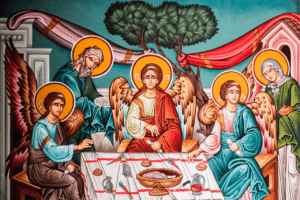Sirach 27:30 – 28:7 (RM) or Genesis 50: 15-21 (RCL); Psalm 103; Romans 14: 7-9 (RM) or 1-12 (RCL); Matthew 18: 21-35.
This is so, so hard. God, is this hard.
We want life to be fair, and a distressing amount of the time, it’s not. Small children already have an acute sense of when chocolate candy or dessert is evenly distributed: “She got a bigger piece than I did. No fair!” (For that matter, so do cats.)
Whatever sense of community the enslaved servants in this story might have had, they rallied to protest when one of their own refused to forgive a relatively small debt owed by another, and had him thrown into debtors’ prison. There’s actually no indication in the story that they knew what had happened when their colleague begged mercy from the king for a greater debt, and the king discharged the debt. They may have reacted simply to what they saw: sheer injustice among peers. They knew unfairness when they saw it.
The genre of a parable employs outrageous imagery to make a point, and probably to entertain a gasping audience while making it. The enslaved man owes the king more money than Elon Musk. Where would he get this kind of money? How realistic is that? And how huge is the gap in fairness.
This story is found only in Matthew among the four canonical gospels, thus the source material is untraceable. The initial dialogue between Peter and Jesus doesn’t quite fit the story arc of the parable. The dialogue teaches a practice of generous repeated forgiveness, while the story is about one-time refusal to forgive a tiny debt. The placement of the story following a discourse about the community suggests that the focus of the parable is less about one man’s conduct toward another man, than about how to deal with conflict within a community, in this case the Matthean community of early Jewish-Christians. If Jesus really added this story of a hypocritical debtor onto his teaching on repeated forgiveness, it veers off course. The point is no longer wise counsel to smooth disputes within a church community, but, just perhaps, more a way to shame the consciences of his hearers.
And, I would suggest, it’s the association of forgiveness with guilt and shame on the part of the injured party that makes it so hard for those of us who grew up hearing Christian moral teachings couched in simple directives when we were children. A good Christian is supposed to forgive. Always. All the time. The victim should feel guilty if she or he doesn’t forgive right away, on top of the anger, or pain, or humiliation. No fair.
Often survivors of domestic abuse have told of seeking counselling from a priest or pastor who shames them into returning to a violent home, arguing that they must obey their wedding vows, or offer up sufferings as did Jesus on the cross, or forgive the abuser in the face of continuing danger. Often in couples counselling an abuser will go all contrite, pleading with the spouse to forgive and return home, while promising never, ever, to do it again. Soon, of course, the abuser does it again. Forgiveness doesn’t stick.
The Christian injunction to forgive each other does not extend to accepting abuse or attack, or to allowing others to be abused or injured. No one is required to submit to evil. One-on-one abuse, whether rooted in misogyny, racism, or another form of structural hatred, draws strength from a larger ideological drive embedded within a society or a culture. One-on-one forgiveness does not begin to touch the deeper evil.
What may work better would be to cast “forgiveness” in terms of healing for the victim, a precondition of which must be safety and freedom from abuse. This lies entirely within the Christian faith when coupled with the call to evildoers to conversion, metanoia, a change of heart that transforms the whole person, inside and out. A call to conversion on the part of the abuser can be part of restorative justice circles aimed at healing for an individual, a family or a society.
Jesus healed. Jesus protected the weak. And Jesus never hesitated to call out evil. By the power of the Spirit let’s do the same.
© Susan K. Roll
Susan Roll retired from the Faculty of Theology at Saint Paul University, Ottawa, in 2018, where she served as Director of the Sophia Research Centre. Her research and publications are centred in the fields of liturgy, sacraments, and feminist theology. She holds a Ph.D. from the Catholic University of Leuven (Louvain), Belgium, and has been involved with international academic societies in liturgy and theology, as well as university chaplaincy, Indigenous ministry and church reform projects.




